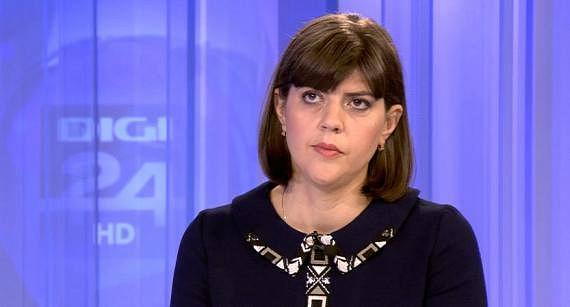Romania’s chief anticorruption prosecutor says justice minister not a man of good faith

Romania’s chief anticorruption prosecutor Laura Codruta Kovesi criticized justice minister Florin Iordache for his attempt to change the Penal Code and grant pardoning through emergency ordinances, without putting the drafts of these measures into public debate first.
“Why must these changes to the penal Code be made non-transparently, through emergency ordinances? Why haven’t these measures been communicated?” Kovesi said in an interview for local radio station Europa FM on Wednesday, January 18.
She added that in the meeting she had with the justice minister one week before, the minister promised that any changes to the Penal Code and any initiative on pardoning and amnesty would be first discussed with the people working in the justice system. “I see that he has broken this promise. I was expecting this,” Kovesi said, adding that she doubted that justice minister Florin Iordache was a man of good faith.
Her reaction came after the local media reported that the Government planned to approve two emergency ordinances in its Wednesday meeting, one on pardoning and one on changing how some crimes are defined in the penal code. This didn’t happen, however, as President Klaus Iohannis unexpectedly attended the cabinet meeting on Wednesday morning, for the first time since he took power, in December 2014. Iohannis warned Prime Minister Sorin Grindeanu not to put any such ordinances on the agenda of his cabinet’s meetings overnight, without a transparent public discussion of the intended changes.
After the December 11 parliamentary elections, which brought the Social Democratic Party (PSD) and their liberal-democrat allies ALDE the majority in the new Parliament, the talks about changes to the laws on justice intensified.
President Klaus Iohannis made it clear that he would strongly oppose any intention from the Government and Parliament to promote an amnesty law, that would clear the criminal records of local politicians. Chief prosecutors and magistrates also spoke against the idea of an amnesty law. Their reactions came after the new justice minister Florin Iordache said that it was a favorable moment for the Parliament to start talks on an amnesty law.
Chief anticorruption prosecutor defends against runaway businessman’s allegations
The pressure on the National Anticorruption Directorate (DNA) and its chief prosecutor Laura Codruta Kovesi has risen in recent months. Top level politicians, including PSD leader Liviu Dragnea, former Prime Minister Calin Popescu Tariceanu, and former President Traian Basescu, have accused DNA of fabricating cases against top level politicians and business people in Romania, as ordered by foreign interests.
The campaign against DNA’s chief prosecutor intensified after controversial investor and former MP Sebastian Ghita, who has been investigated by DNA in several corruption cases, disappeared right before Christmas. Shortly after his disappearance, Ghita’s TV station Romania TV started broadcasting videos in which the runaway investor made serious allegations against DNA’s Kovesi and against the deputy director of the Romanian Intelligence Service (SRI) Florian Coldea.
Ghita claimed that he used to be friends with both Coldea and Kovesi and thus got inside information on the joint operations of DNA and SRI. He said that both Coldea and Kovesi worked for an intelligence service of one of Romania’s allied countries. He also mentioned the presence of CIA agents at some meetings he allegedly had with Coldea and Kovesi at SRI safe houses.
He also accused Kovesi of fabricating cases against Romanian media moguls to send them to prison and gain control of their TV stations. Ghita claims that he was directly involved in a set-up against Romanian investor Sorin Ovidiu Vantu, the former owner of Realitatea TV, at Kovesi’s request. He also said that in 2012 he arranged to have the plagiarism allegations against Kovesi dismissed.
Ghita’s serious allegations are mixed with a series of personal disclosures, including a story about how he had allegedly partied with Kovesi and Vasile Dancu, a former development minister in the Dacian Ciolos cabinet, at a SRI villa in Sinaia.
Kovesi refrained from making any comment on Ghita’s videos in the past month. However, she broke the silence on Tuesday, January 17, just as SRI’s deputy director, Lieutenant-General Florian Coldea, was dismissed by director Eduard Hellvig at his own request. President Klaus Iohannis also signed a decree approving Coldea’s retirement from active duty, on Tuesday. Coldea decided to step back after Ghita’s allegations, although an internal SRI committee didn’t find anything against him, according to a SRI announcement.
Kovesi gave several interviews to local media outlets on Tuesday in which she addressed some of Ghita’s allegations. She said that she never met Ghita in private and that she was never friends with him. She also denied having attended events with investigated politicians, other than the official events where she was invited as head of DNA. She said she met Ghita at one such public event.
Kovesi said that she would not resign and continue to do her job as head of DNA, which is to investigate top-level corruption, according to Agerpres. She also hinted that the public pressure against her and other prosecutors may be determined by people investigated by the DNA who pay for lobby and smearing campaigns in the media.
editor@romania-insider.com















